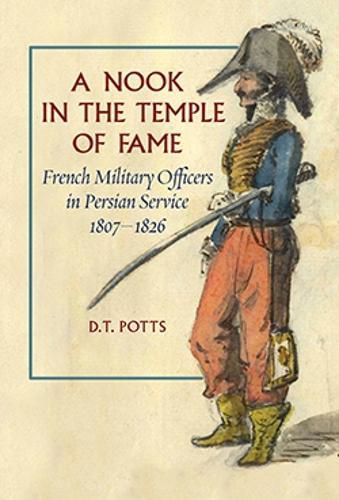Readings Newsletter
Become a Readings Member to make your shopping experience even easier.
Sign in or sign up for free!
You’re not far away from qualifying for FREE standard shipping within Australia
You’ve qualified for FREE standard shipping within Australia
The cart is loading…






This title is printed to order. This book may have been self-published. If so, we cannot guarantee the quality of the content. In the main most books will have gone through the editing process however some may not. We therefore suggest that you be aware of this before ordering this book. If in doubt check either the author or publisher’s details as we are unable to accept any returns unless they are faulty. Please contact us if you have any questions.
In the interests of exploiting Irans location and natural resources to launch a projected attack on British India, Napoleon sent a delegation of military advisers to Fath 'Ali Shah. They were charged with designing and reinforcing fortifications, training cavalry and infantry to European standards, and establishing a centre of artillery production. He also sent geographers to reconnoitre the country, documenting routes that might be used by French and Persian land forces in a planned but never fulfilled invasion of India. The work of these officers has often been mentioned in passing but rarely has it been studied in detail. Although shifting geo-political forces ended the Napoleonic experiment, French involvement in the armed forces of 'Abbas Mirza and his brother Mohammad 'Ali Mirza continued. Despite the presence of English officers at Tabriz, the renegade Gaspard or J.B. Drouville headed to Iran, followed after the debacle at Waterloo by a handful of French officers who sought employment outside their native land. This book is the first detailed study of the French officers who worked in Iran between 1807 and 1826, the impact they had, the innovations they introduced, their trials, and their tribulations. French military involvement in early Qajar Iran produced a host of stories deserving the attention of anyone with an interest in the seeds of military modernisation in the Middle East, technology transfer in the 19th century, and the social, political, diplomatic, and military history of the Middle East in one of its most tumultuous phases.
$9.00 standard shipping within Australia
FREE standard shipping within Australia for orders over $100.00
Express & International shipping calculated at checkout
This title is printed to order. This book may have been self-published. If so, we cannot guarantee the quality of the content. In the main most books will have gone through the editing process however some may not. We therefore suggest that you be aware of this before ordering this book. If in doubt check either the author or publisher’s details as we are unable to accept any returns unless they are faulty. Please contact us if you have any questions.
In the interests of exploiting Irans location and natural resources to launch a projected attack on British India, Napoleon sent a delegation of military advisers to Fath 'Ali Shah. They were charged with designing and reinforcing fortifications, training cavalry and infantry to European standards, and establishing a centre of artillery production. He also sent geographers to reconnoitre the country, documenting routes that might be used by French and Persian land forces in a planned but never fulfilled invasion of India. The work of these officers has often been mentioned in passing but rarely has it been studied in detail. Although shifting geo-political forces ended the Napoleonic experiment, French involvement in the armed forces of 'Abbas Mirza and his brother Mohammad 'Ali Mirza continued. Despite the presence of English officers at Tabriz, the renegade Gaspard or J.B. Drouville headed to Iran, followed after the debacle at Waterloo by a handful of French officers who sought employment outside their native land. This book is the first detailed study of the French officers who worked in Iran between 1807 and 1826, the impact they had, the innovations they introduced, their trials, and their tribulations. French military involvement in early Qajar Iran produced a host of stories deserving the attention of anyone with an interest in the seeds of military modernisation in the Middle East, technology transfer in the 19th century, and the social, political, diplomatic, and military history of the Middle East in one of its most tumultuous phases.